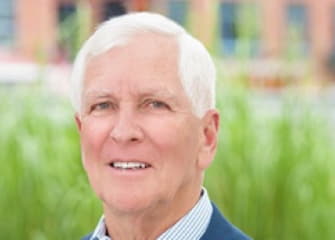
Ben Schapiro
Click here for Part I, Part II & Part IV
Ben Schapiro probably knows all there is to investment, and then some more. Last year, QuestMark Partners’ founder partner completed 50 years in a career that has spanned institutional, international and private clients, real estate, corporate finance, M&As and venture capital.
Armed with a degree in economics, Schapiro started his career in 1966 at Robert Garrett & Sons, which later merged into Alex.Brown & Sons. In 1998, he left Alex.Brown to cofound QuestMark, focusing on expansion-stage venture capital. Over the past nearly 20 years, the Baltimore firm has invested nearly a billion dollars in 61 companies, closed on six IPOs and 28 M&A events, and now plans a fifth fund later this year or early next year.
Typically, the Baltimore firm invests in young companies with revenues of between $5 million and $50 million, and a proven technology or product. It then gets closely involved with the product before wringing out juicy returns. It is extremely choosy in its investments and has a rigorous process that ends in a mere 2.5% of startups being offered a term sheet.
In an interview with citybizlist’s Edwin Warfield, Schapiro recounts his career, starting at $5,000 a year, what not working on Wall Street did to his integrity, and the QuestMark investment window. He also spoke about recent investments, one alongside Microsoft and Kleiner Perkins in InsideSales at a valuation of $1.5 billion, and the impending launch of QuestMark’s fifth fund.
EDWIN WARFIELD: Fund III in 2007 – 10 exits to date, 8 companies remaining, 2 in late stage acquisition discussions.
BEN SCHAPIRO: In 2007, we launched QuestMark Three that was a $300 million fund. In retrospect it was too large. We actually turned away capital and we invested that fund in 18 portfolio companies. We have had some pretty good liquidity there, we have some companies that remain in that portfolio, eight that are on a track to get liquid. I think we will see a couple of those events happen this year and that will determine the outcome of that fund.
In 2013, we realized that $300 million was too much capital. We went on to launch a $200 million fund and we closed on a $152 million and that was a disappointment. We had some commitments that never closed and we decided to stop fundraising, we are not good at fundraising, it was a difficult environment and that will probably prove to be our best fund. We have made nine investments in that fund all on a good track and we will probably make two or three more investments before we launch the next fund.
If you look at the venture environment, you could really break it down, I guess, simplistically into early stage or later expansion stage companies. What the early-stage guys do is they will make a whole lot of bets on many companies in the portfolio and most of these companies will be pre-revenues, they will be the Series A or seed round and they hope that the technology works out and they are going to get some terrific winners. So we know those winners, you can look at Google or Facebook and so forth but when they invest they probably will make money on 25% of the portfolio companies and they will probably lose money on many of the ones in there.
What we do in the late stage areas is we try to find companies, as I have said, that have proven products, management teams in place and commercial revenues. The hope is that we will not lose money on any of these companies, that they will not disappear or go bankrupt. That does not always happen but our returns have been more or less in the two to 6X as compared to a venture earlier stage-fund that might get a 100X on a company.
Our space did get…goes in and out of being competitive, we have gone through periods where the mutual funds, the hedge funds and other people come into this space and pay high prices for companies. Lots of times, the mutual funds will do it because they want to get into a potential IPO company before it goes public. That did not work out in 2014 and 2015. Fortunately for us, they are not as active in our space so, we are seeing valuations come down and we are able to get into some really terrific companies with the traditional venture capital investors in their, people that know how to build companies and guide them.
EDWIN WARFIELD: Can you tell us about your deal pipeline? How many companies do you screen – 447+, too early 155, lack differentiation 154, valuation 35; term sheet just 11?
BEN SCHAPIRO: When you look at our deal pipeline, as I have said, many of these come from the early stage venture investors who need a later stage partner and we tend to lead grounds, we like to do lead, we like to price, we like to lead the due diligence, we will take board seats or observer seats and one of the things that helps us get into deals is we are very aggressive with customer introductions and the companies like that. We will circulate a list of every company that we have invested in and the CEO’s name and contact, and use that as a reference that helps us get into deals. We also go out to conferences, we read a lot, we hear about companies from fellow board members, so this all comes into a funnel where we look at hundreds of deals to make a handful of investments. When I say hundreds, these are hundreds of deals that qualify because they do have commercial revenues, they are in an area of space that interests us and then we dig and dig and dig and we have usually months to do our due diligence and to figure out whether we think we are making the right investment or not.
Our most recent fund that we are investing now we have probably looked at well over 400, maybe close to 500 companies that would qualify, we whittle those down sometimes when you are doing your due diligence they prove to be a little earlier or less proven than you want and then valuation comes into play, we tend to be very cautious on valuations and out of those 400 to 500 companies that we looked at we might put in term sheets, I think in Fund Four we put in term sheets for 11 companies and two we lost, we invested in nine and I think that has proven to be a very good portfolio of nine companies. One has already gone public. it is trading at double the price that we invested in and then we just exited Service Max, which was acquired by GE for a nice return as well.
Connect with Ben on LinkedIn
Sponsored by:

WMS Partners was founded in 1993 on the principles of providing our clients with the same level of service that a Chief Financial Officer (CFO) would dedicate to a successful corporation. As your advocate and central point for financial affairs, we work proactively with your service providers, including accountants, attorneys, consultants, insurance professionals and philanthropic advisors.
We are large enough that we provide exposure to many unique ideas and strategies in the investment, estate, tax, financial advisory and risk management arena; but small enough to provide discreet individualized guidance.


Edwin Warfield, CEO of citybizlist, conducts the CEO Interviews.
If you're interested in reaching CEOs, please contact edwin.warfield@citybuzz.co
Connect on LinkedIn



































